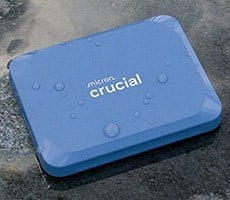ATTO is a more straight-forward type of disk benchmark that measures transfers across a specific volume length. It measures raw transfer rates for both reads and writes and graphs them out in an easily interpreted chart. We chose .5kb through 8192kb transfer sizes over a total max volume length of 256MB. This test was performed on blank, formatted drives with default NTFS partitions in Windows Vista. We've also provided test results from a couple of different Intel single and RAID 0 SSD setups for reference.
 |
| ATTO and CrystalDiskMark Benchmarks |
| Synthetic Small and Large File Transfer Tests | |

OCZ Z-Drive m84 256GB
|

Intel X25-M x 2 RAID 0 160GB
|
Here the Z-Drive shows its Achilles Heel, that being small file transfers below 64K. In fact, in terms of read performance, the Z-Drive m84 doesn't really stretch its legs until you hit 256K file sizes. Read performance is just plain lackluster in fact, down at 32K and below, where the Z-drive doesn't even keep up with the average single SSD. What's odd is the product's write performance which begins to scale nicely at 16K file size transfers on up. Regardless, you can see, with respect to large sequential transfers, the Z-Drive has significant potential. This test hints to us that there is definitely available optimization to be done with the product, at least with respect to small block reads. If write performance can scale so well, there's really no reason read performance should suffer so much with small transfer sizes. Historically small file writes have been much more of a bottleneck for the average SSD, while reads have been a strength.
CrystalDiskMark is a new synthetic test we've started looking at that tests both sequential as well as random small and large file transfers. It does a nice job of providing a quick look at best and worst case scenarios with SSD performance, best case being large sequential transfers and worse case being small 4K transfers. Once again we've provided some tests on various Intel X25-M SSD configurations just for reference as a baseline.

Intel X-25M G2 - 160GB Single SSD

Intel X25-M G1 X4 RAID 0 - 320GB

OCZ Z-Drive m84 256GB
This test paints a clearer picture of the OCZ Z-Drive under various workloads. If we look at large sequential transfers, the Z-Drive competes handily with even a 4 x Intel X25M RAID 0 array, in fact blowing it out of the water in write performance, but falling a bit short on read throughput, though still offering impressive numbers. At 512K reads and writes the Z-Drive looks similar with significantly better write performance and almost performance parity with the Intel quad RAID 0 array. However, when we drop down to tiny 4K file sizes the Z-Drive takes a knee in a big way and it's not even able to keep pace with a single Intel X-25M SSD. Obviously, looking at all of the numbers at the 4K level, even the Intel RAID array took a massive hit and the Z-Drive actually more than doubled its performance in read throughput, while falling way behind on small block writes.












